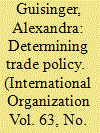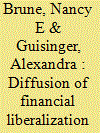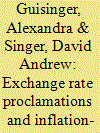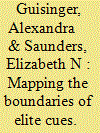|
|
|
Sort Order |
|
|
|
Items / Page
|
|
|
|
|
|
|
| Srl | Item |
| 1 |
ID:
090612


|
|
|
| 2 |
ID:
152887


|
|
|
|
|
| Summary/Abstract |
Over the past three decades, many developing countries have liberalized their capital accounts. Recent studies suggest that these policy changes were interdependent and diffused through networks of peers. This article strengthens the literature on the diffusion of financial liberalization in several ways. Theoretically, we distinguish between concrete and more amorphous causal processes by which policies are diffused. We argue that networks vary by degree of interdependence, structure, and self-selection and hypothesize that diffusion of liberalization policies is more likely across networks that are more structured, interdependent, and self-selected, such as regional integration agreements (RIAs). Empirically, we employ both an aggregate measure of openness as well as a policy-to-policy measure of capital control transmission. Based on panel data for 114 emerging economies over 1973–2002, we replicate the finding of multiple diffusion processes using the aggregate measure, but find these results are substantially weaker using the policy-to-policy measure. Of all the networks tested, RIA networks were the most robust to different models and measurement.
|
|
|
|
|
|
|
|
|
|
|
|
|
|
|
|
| 3 |
ID:
095026


|
|
|
|
|
| Publication |
2010.
|
| Summary/Abstract |
If governments choose economic policies that often run counter to their public commitments, are those commitments meaningless? We argue that government proclamations can be critical in signaling economic policy intentions. We focus on the realm of exchange rate policy, in which countries frequently implement an exchange rate regime that differs from the officially declared regime. We argue that the official exchange rate regime is one of the most important signals of a government's economic policy preferences. When a government makes a de jure public commitment to a fixed exchange rate, it sends a signal to domestic and international markets of its strict monetary-policy priorities. In contrast, a government that proclaims a floating exchange rate signals a desire to retain discretion over monetary policy, even if it has implemented a de facto fixed rate. We use data on 110 developed and developing countries from 1974 to 2004 to test two hypotheses: first, that governments that adopt de facto fixed exchange rates will experience less inflation when they back up their actions with official declarations; and second, that governments that abide by their commitments-as demonstrated by a history of following through on their public declarations of a fixed exchange rate regime-will establish greater inflation-fighting credibility. Within developing countries, democratic institutions enhance this credibility. Results from fixed-effects econometric models provide strong support for our hypotheses.
|
|
|
|
|
|
|
|
|
|
|
|
|
|
|
|
| 4 |
ID:
065781


|
|
|
| 5 |
ID:
155499


|
|
|
|
|
| Summary/Abstract |
When and how do elite messages shape mass opinion on international issues? Do informational or partisan components of elite cues dominate? Recent survey experiments offer conflicting insights. We argue that issue context matters, and that the single-issue nature of most survey experiments masks systematic variation in how elite cues affect attitudes across international issues. These effects depend on the baseline distribution of mass opinion on the issues themselves. Two characteristics of underlying opinion prove crucial: first, the share of those not aligned with expert opinion, and second, the degree of partisan polarization. Where polarization is limited, information effects should dominate. Where issues are polarized, information intake should be limited by partisan attribution. We test these hypotheses using nine survey experiments across a range of issues, including the rise of China, climate change, international institutions, and the use of force. At one extreme, all messages—even those endorsed by generic or opposition experts—can shift opinion; at the other, only partisan-attributed messages matter. Our findings are important not only for understanding public opinion about international issues but also for those interested in mobilizing opinion in a democratic setting.
|
|
|
|
|
|
|
|
|
|
|
|
|
|
|
|
|
|
|
|
|